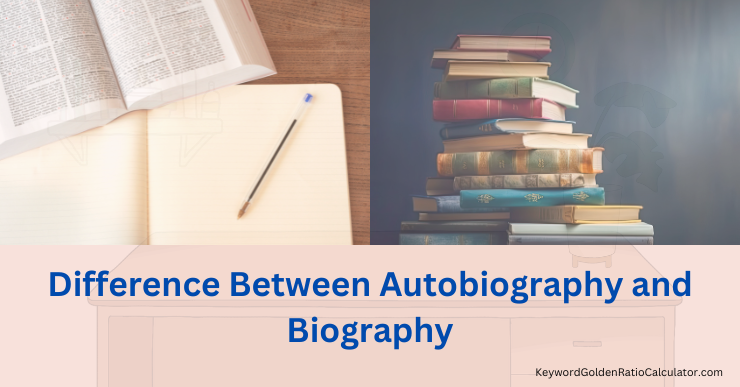Let’s admit it, it’s quite easy to jumble up the terms ‘autobiography’ and ‘biography’.
Both weave tales about a person’s life, filled with exciting narratives and intriguing insights into their past.
However, despite these similarities, there are fundamental differences between the two.
This article will unequivocally break down these differences, taking you through an enlightening journey between the world of autobiographies and biographies. Fasten your seatbelts!
Autobiography: A Glimpse into Self-Told Stories

Autobiographies are akin to holding a mirror up to one’s life, presenting personal accounts in an engaging and in-depth manner.
From day one till the present, they’re akin to a personal diary-turned-public.
Key Features of Autobiographies
First-person narrative: Autobiographies predominantly use the first-person narrative. This ‘I’ perspective paints vivid pictures, pulling readers directly into the author’s world.
Authentic experiences: Since they are written by the individual themselves, autobiographies offer a raw and unfiltered perspective into their lives.
Emotional intelligence: An autobiography digs deep into the author’s emotions. They express feelings, thoughts, and insights from personal experiences.
“Autobiography is an unrivalled vehicle for telling the truth about other people.”— Philip Guedalla
Biography: A Window into Another’s World

Biographies, on the other hand, are stories written by an individual about someone else’s life.
They capture the essence of someone’s journey from an outsider’s perspective.
Key Features of Biographies
- Person-centric narrative: Biographies generally adopt a third-person narrative. They explore a person’s life from a distanced viewpoint, hence providing an impartial account of their journey.
- Research intensity: Writing a biography involves thorough research. Everything, from conducting interviews to reading previous works and articles, is crucial to accurately portray someone’s life.
- Differing perspectives: A biography can offer mosaic views, piecing together diverse perspectives on the subject’s life from various sources.
“A great biography should, like the close of a great drama, leave behind it a feeling of serenity. We collect into a small bunch the flowers, the few flowers, which brought sweetness into a life, and present it as an offering to an accomplished destiny.” — Andre Maurois
Autobiography and Biography: A Dueling Dichotomy
On the surface, the primary difference between autobiography and biography seems straightforward —who the author is.
Yet, as we delve deeper, more distinctions arise.
Writing Style and Point of View
Autobiographies are typically more emotionally charged as they are a personal account, whereas biographies offer objective analysts of a person’s life.
Authenticity of Information
Autobiographies present firsthand experiences, while biographies depend on secondhand information.
Therefore, autobiographies usually hold more personal authenticity, while biographies achieve factual accuracy through meticulous research.
Picture of the Protagonist
An autobiography can hint at a subjective portrayal of the writer, while a biography, by essence, aims to paint an unbiased picture of the subject.
“In writing biography, fact and fiction shouldn’t be mixed, and if they are, the fiction parts should be printed in red ink, the fact parts in black ink.” -Catherine Drinker Bowen
Wrapping Up: Two Sides of the Same Coin
Autobiography and biography, striking in their distinctions, are two sides of the same coin.
Both unveil the journey of a life, one from an internal vantage point, another from an exterior lens.
Whether you prefer the introspection of autobiography or the scrutinized lens of biography depends on your personal choice.
At the end of the day, both are powerful story-telling tools that illuminate lives from different angles.
As readers, it is important for us to know the difference between the two.
And as aspiring writers, an understanding of this divergence will guide you in choosing the right narrative style to portray life stories with authenticity and accuracy.
Embarking on writing a biography or an autobiography? Now you know where to start!
What is a biography?
A biography is an account of someone's life, written by another person. The writer of a biography undertakes exhaustive research to gather detailed information about the person's life history, experiences, achievements, and more.
What distinguishes an autobiography from a biography?
The primary difference between an autobiography and a biography lies in the authorship. An autobiography is written by the person the story is about, offering a first-person account of the individual's life. In contrast, a biography is written by someone else, providing a third-person perspective on that individual’s life.
Can an autobiography be written by someone else?
No, an autobiography, by definition, is a person's own account of their life. If an account of a person's life is written by someone else, it is called a biography.
How does the perspective differ in an autobiography and a biography?
In an autobiography, the perspective is first-person, as the writer is the subject of the story. They share their own thoughts, feelings, experiences, and perspectives directly. In contrast, a biography is written from a third-person perspective as the writer is an external observer, interpreting and presenting the subject's life based on their research.
Yes, a biography can be authorized or unauthorized. An authorized biography is written with the consent and participation of the individual whose life story is being told. An unauthorized biography is written without such involvement or approval.
Is there a difference in credibility between an autobiography and a biography?
Both formats can be credible, depending on the accuracy of the information and the veracity of the source. However, autobiographies may contain subjective interpretations due to personal bias, while biographies might face restrictions in terms of access to verifiable information.
Does an autobiography or biography require research?
Both need an amount of research. An autobiographer might need to revisit past experiences, personal diaries, letters, or talk to people to accurately recall events. A biographer, on the other hand, relies heavily on detailed research, including interviews with the subject, their colleagues, or family, as well as exploring written documents, archives, or public records.
Which is easier to write: an autobiography or a biography?
There's no definitive answer as it depends on individual skill, interest, and perspective. An autobiographer has firsthand access to their memories but must also grapple with personal bias. A biographer needs to do extensive research but can maintain a more detached, objective viewpoint.
Can fiction elements be used in autobiographies and biographies?
While autobiographies and biographies are non-fiction genres, they may utilize storytelling techniques to make the narrative engaging. However, the key is maintaining the truthfulness of the account. Any added creative flair should not distort the facts.

